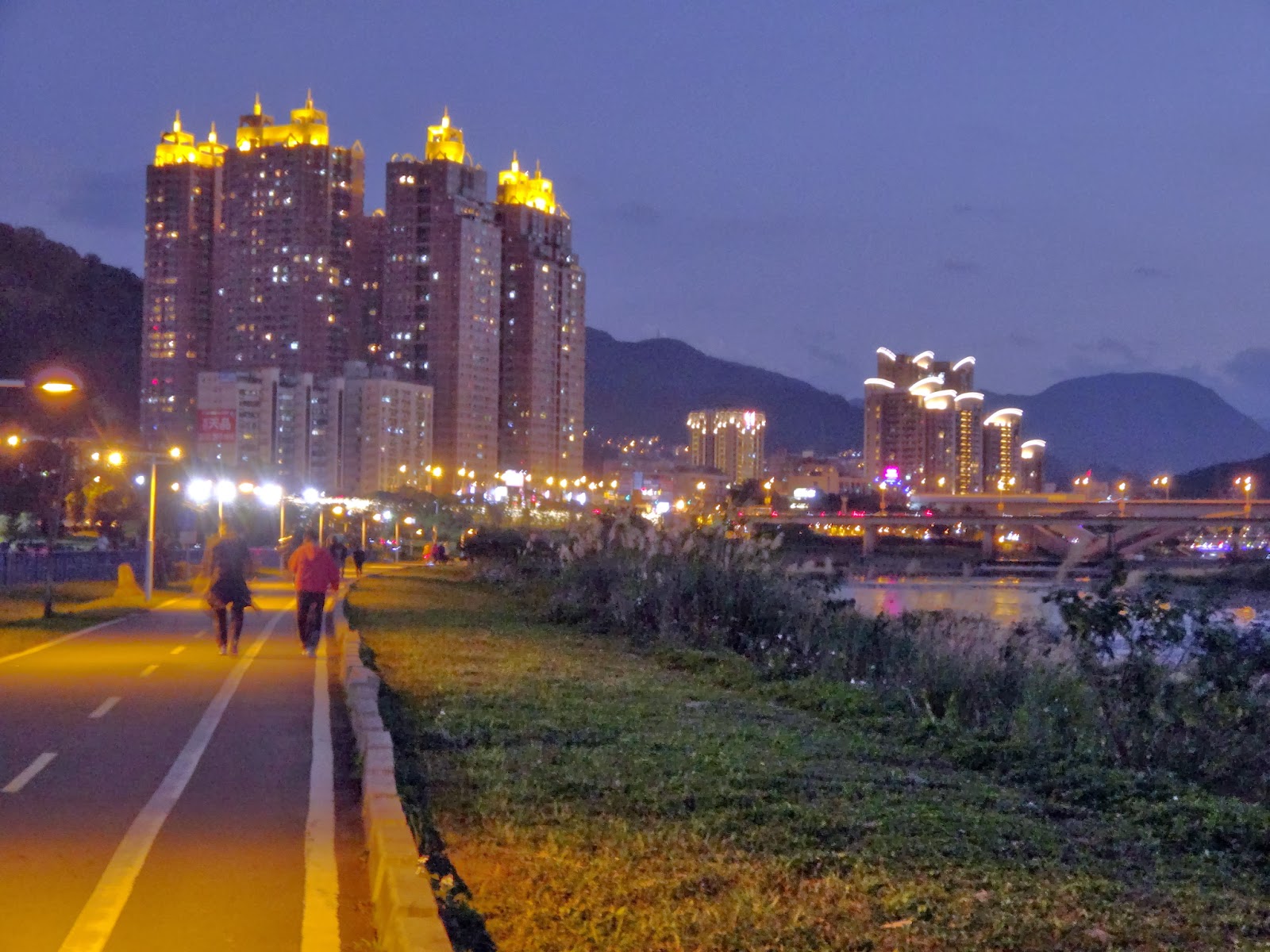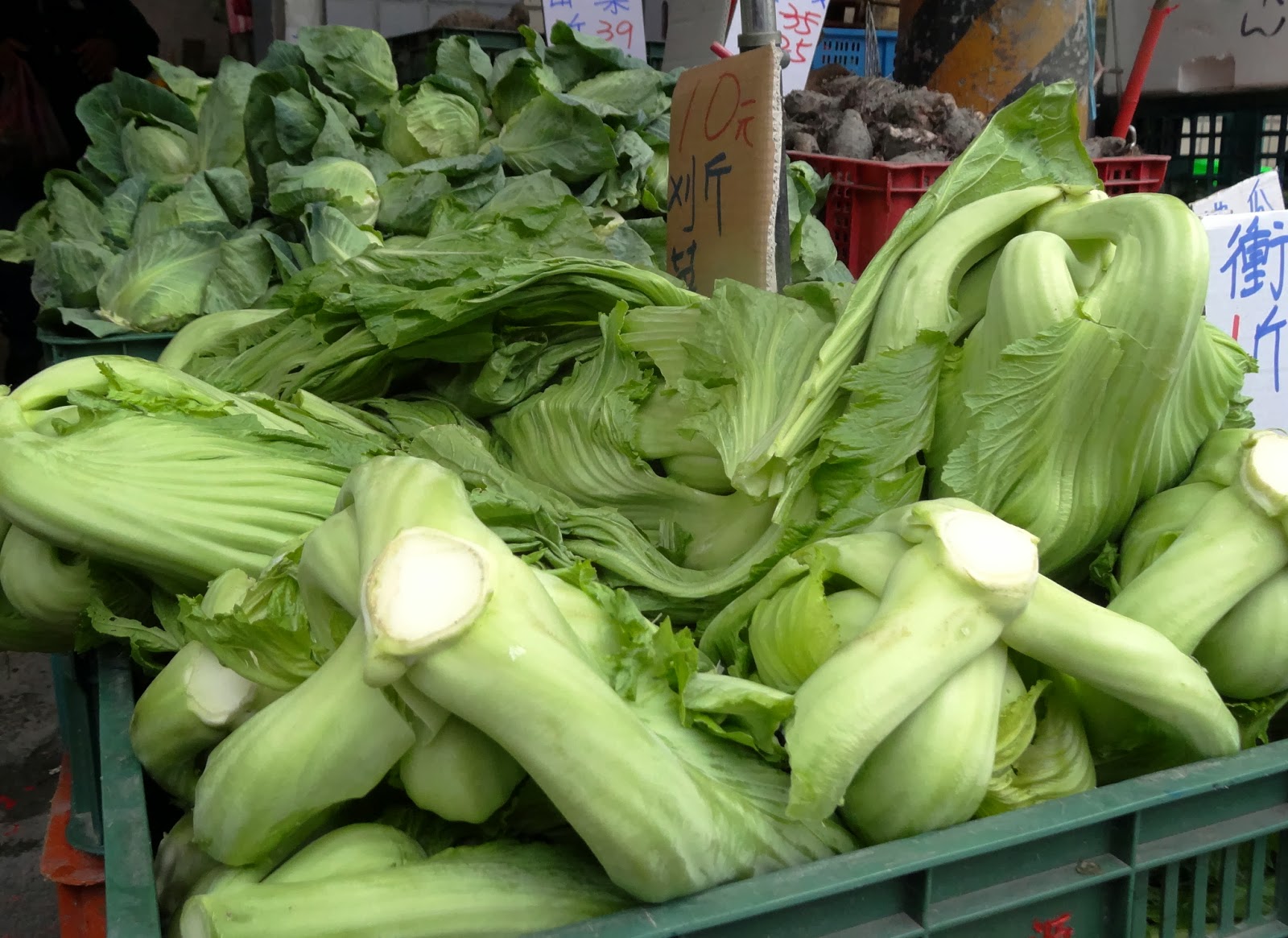These days, whenever the winter cold and rain abates for a short while, beautiful, balmy weather draws everyone outside. At the weekends, the streets are full of couples, friends and families out to make the most of the sunshine.
We thought we were ahead of the game a Sunday or two ago when we arrived in Xindian around 4 o'clock, as part of a cunning plan to to have dinner by the riverside, then walk off the excess while enjoying the sunset. But the restaurants were already full of smarter people than us, and we were lucky to get a table.
The riverside at Bitan is a lovely place for an evening walk. Despite its popularity, it never feels too crowded, maybe due to the expansive view across the river to the green mountains beyond.
A few times previously we've hired a pedalo and splashed around a bit, but this time we thought we would walk to Xiaobitan instead. Walking long distances isn't an activity for the faint-hearted once the weather turns warmer, so it's a good idea to take advantage of opportunities in winter.
But dinner came first. At the riverside restaurants in Bitan you pay for the view as well as your meal, but on the plus side menus often have choice items. My favourite discovery that day was organic beer and cider, which had been exported from the U.K. to the U.S., and then on to Taiwan.
Apricot ale is surprisingly pleasant - not too sweet, and slightly bitter.
Someone else enjoyed a banana chocolate milkshake.
I finally decided I'm becoming middle-aged, because it seems whenever we eat out these days I end up ordering salad and soup. Only this time I couldn't even finish those..
..mostly due to the nature of the soup.
Bread tends to be two sweet for Western tastes in Taiwan, but this was just right.
I was sadly too full to even try these lamb skewers and poppadoms, but reports confirm they were as good as they looked.
Our evening walk was just as enjoyable as our meal, and reduced guilty feelings about eating too much.
Here's hoping for a few more beautiful winter days.
Monday, 20 January 2014
Thursday, 16 January 2014
A Taiwanese Wet Market
There is no word in Chinese for a wet market, as far as I've been able to find out. A market selling fresh fruit, vegetables, meat and fish, and that opens in the early morning, is still such a normal phenomenon it needs no further definition.
Donghu Road market is just over the road from Donghu MRT station, and the stallholders are all locals hoping to make a decent living by selling good quality produce to discerning Taiwanese shoppers. Over our time living in Taiwan I've enjoyed many local foods in restaurants but I'm still not very familiar with them in their uncooked form, so it was with interest I joined a small class on shopping in a wet market.
Some things were already very familiar, such as the king/queen of vegetables in Chinese cooking - baicai, 白菜, or white cabbage. This vegetable is so adored it's a frequent subject of intricate jade carvings and other artwork, representing fertility and abundance. Another vegetable I've been pleased to make the acquaintance of is hongcai, 红菜,or red vegetable. I bought some of this fresh from the field once on a trip through the mountains, incredibly cheaply. Its deep purple colour indicates it's full of iron, and so is thought of as good for women to eat.
No wet market would be complete without delicious baicai.
Hongcai's rich colour indicates it's bursting with vitamins and minerals.
By contrast, our guide also introduced us to niubang, 牛旁,or burdock, which is, predictably, thought of as a man's vegetable.
Some vegetables were completely unfamiliar, such as roudou or 肉豆. It has no English name, but translates literally as meat bean, and is named for its rich texture.

Roudou is the red bean in the foreground. It's eaten whole. I don't recall ever eating this.
Caigua, 菜瓜, or vegetable loofahs are the same as the thing you scrub your back with in the bath, before they have rotted and dried out. Eaten fresh, I have to admit I don't particularly like this vegetable's watery, slightly slimy taste.
Another very popular vegetable I used to only ever encounter in another form is jiecai, 芥菜, or mustard. Insanely popular as a fresh vegetable, you can eat its leaves or its stalk, or both together.
I mustn't forget to mention at least two of Taiwan's delicious fruits. At this time of year, there's a limited selection of local fruit available, but two particularly tasty ones are zaozi, 棗子, or jujubes, and lianwu, 連霧, or wax apples.
Zaozi are similar to apples but have a large seed instead of a core. They're also lighter and crisper than apples.
Lianwu are also very light, fresh and juicy, but have a slightly bitter skin.
Fungi play a big role in Chinese cooking, and there are many varieties available. Drying mushrooms concentrates their flavour, and at Chinese New Year boxes of them are commonly given as gifts.
The NT$200 price tag for this bag is equivalent to about £4. Next to the mushrooms is a bag of dried chrysanthemum leaves.
Similar to other countries that experience changing seasons, Taiwanese and Chinese cooking uses dried, pickled and salted foods during the coldest months of the year. These piles of white strips are dried, salted bamboo shoots:
Something I eat for breakfast when I meet with my friend for language exchange was also on sale. Breakfast shop food isn't the healthiest in the world, but luobogao, 蘿蔔糕, or radish cake, isn't too bad.
Taro cake is to the left, radish cake in the middle and, I think mochi - a kind of glutinous rice paste - with seasoning bags is on the right. Sliced and fried, radish cake is tasty and filling.
I haven't mentioned a tenth of the goods on sale at Taiwanese wet markets. Fresh meat and fish figure hugely, and cooking staples such as many varieties of rice wine and soy sauce are also sold. Full of high quality, very fresh produce, the only problem with visiting a wet market in Taiwan is that you'll end up buying more than you can possibly eat.
Donghu Road market is just over the road from Donghu MRT station, and the stallholders are all locals hoping to make a decent living by selling good quality produce to discerning Taiwanese shoppers. Over our time living in Taiwan I've enjoyed many local foods in restaurants but I'm still not very familiar with them in their uncooked form, so it was with interest I joined a small class on shopping in a wet market.
Some things were already very familiar, such as the king/queen of vegetables in Chinese cooking - baicai, 白菜, or white cabbage. This vegetable is so adored it's a frequent subject of intricate jade carvings and other artwork, representing fertility and abundance. Another vegetable I've been pleased to make the acquaintance of is hongcai, 红菜,or red vegetable. I bought some of this fresh from the field once on a trip through the mountains, incredibly cheaply. Its deep purple colour indicates it's full of iron, and so is thought of as good for women to eat.
No wet market would be complete without delicious baicai.
Hongcai's rich colour indicates it's bursting with vitamins and minerals.
By contrast, our guide also introduced us to niubang, 牛旁,or burdock, which is, predictably, thought of as a man's vegetable.
Some vegetables were completely unfamiliar, such as roudou or 肉豆. It has no English name, but translates literally as meat bean, and is named for its rich texture.

Roudou is the red bean in the foreground. It's eaten whole. I don't recall ever eating this.
Caigua, 菜瓜, or vegetable loofahs are the same as the thing you scrub your back with in the bath, before they have rotted and dried out. Eaten fresh, I have to admit I don't particularly like this vegetable's watery, slightly slimy taste.
Another very popular vegetable I used to only ever encounter in another form is jiecai, 芥菜, or mustard. Insanely popular as a fresh vegetable, you can eat its leaves or its stalk, or both together.
I mustn't forget to mention at least two of Taiwan's delicious fruits. At this time of year, there's a limited selection of local fruit available, but two particularly tasty ones are zaozi, 棗子, or jujubes, and lianwu, 連霧, or wax apples.
Zaozi are similar to apples but have a large seed instead of a core. They're also lighter and crisper than apples.
Lianwu are also very light, fresh and juicy, but have a slightly bitter skin.
Fungi play a big role in Chinese cooking, and there are many varieties available. Drying mushrooms concentrates their flavour, and at Chinese New Year boxes of them are commonly given as gifts.
The NT$200 price tag for this bag is equivalent to about £4. Next to the mushrooms is a bag of dried chrysanthemum leaves.
Similar to other countries that experience changing seasons, Taiwanese and Chinese cooking uses dried, pickled and salted foods during the coldest months of the year. These piles of white strips are dried, salted bamboo shoots:
Something I eat for breakfast when I meet with my friend for language exchange was also on sale. Breakfast shop food isn't the healthiest in the world, but luobogao, 蘿蔔糕, or radish cake, isn't too bad.
Taro cake is to the left, radish cake in the middle and, I think mochi - a kind of glutinous rice paste - with seasoning bags is on the right. Sliced and fried, radish cake is tasty and filling.
I haven't mentioned a tenth of the goods on sale at Taiwanese wet markets. Fresh meat and fish figure hugely, and cooking staples such as many varieties of rice wine and soy sauce are also sold. Full of high quality, very fresh produce, the only problem with visiting a wet market in Taiwan is that you'll end up buying more than you can possibly eat.
Subscribe to:
Posts (Atom)

















